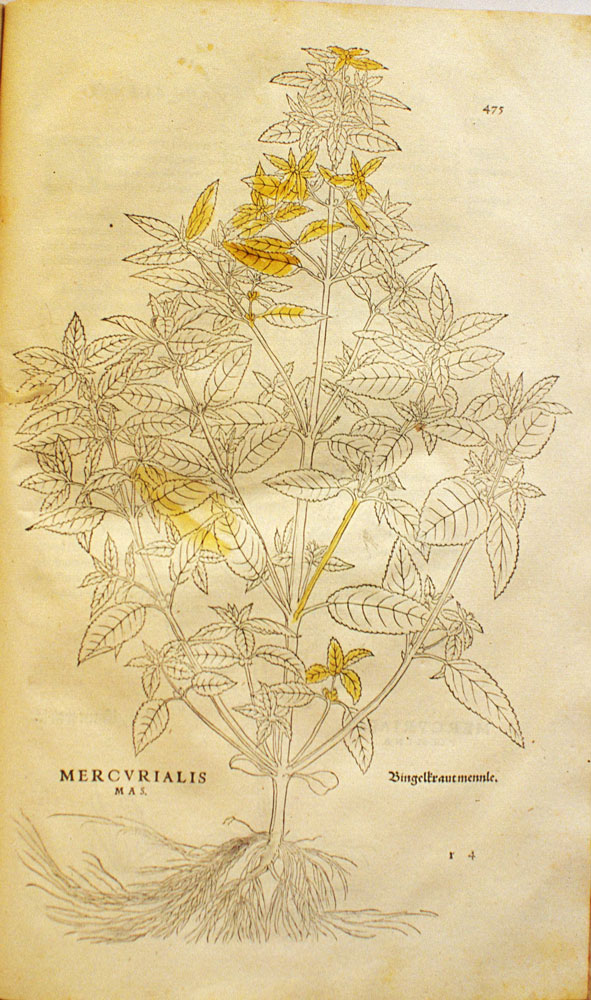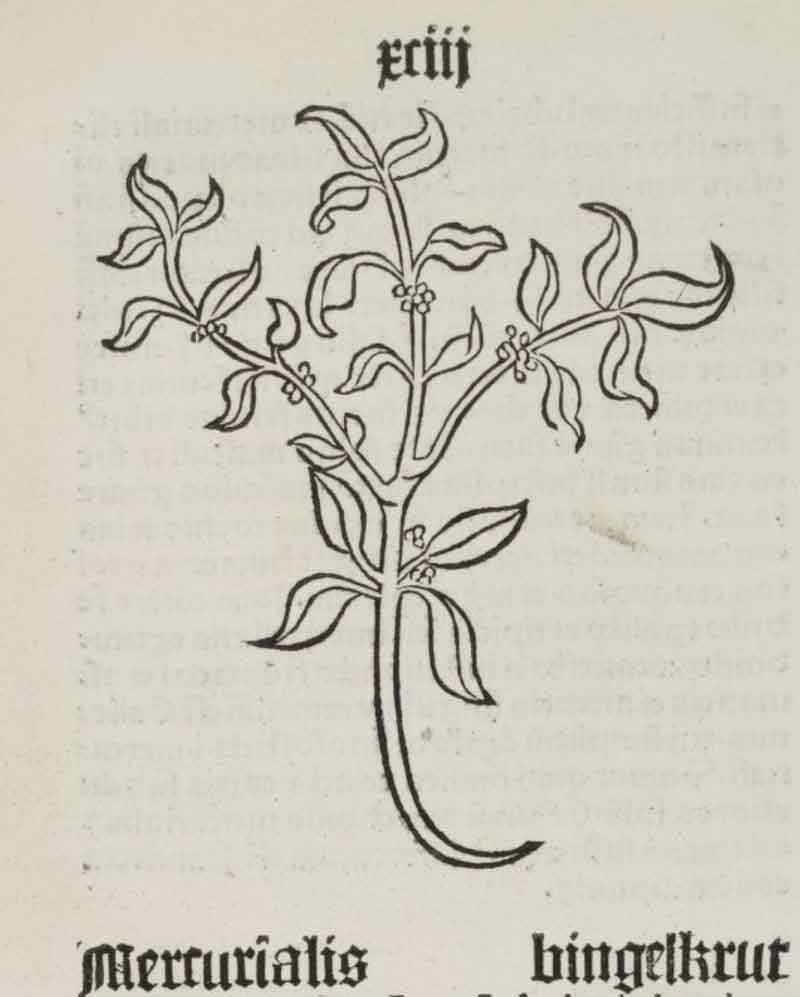as mercuriale from Mercury;
Original French: comme Mercuriale de Mercure:
Modern French: comme Mercuriale de Mercure:
Among the plants named from those who first invented, discovered, cultivated, domesticated, or appropriated them.
Notes
Mercuralis
mercurialis

Mercurialis mas
Bingelkraut mennle
mercuriale
Linozostis sive parthenion Mercurii inventum est. ideo apud Graecos Hermu poan multi vocant eam, apud nos omnes mercurialem. duo eius genera: masculus et femina, quae efficacior. caule est1 cubitali, interdum ramoso in cacumine, ocimo angustioribus foliis, geniculis densis, alarum cavis multis, semine in geniculis dependente feminae copioso, mari iuxta genicula stante rariore ac brevi contortoque, feminae soluto et candido. folia maribus nigriora, feminis candidiora, radix supervacua, praetenuis. nascuntur in campestribus cultis. mirumque est quod de utroque eorum genere proditur: ut mares gignantur hunc facere, ut feminae illam. hoc contingere, si a conceptu protinus bibatur sucus in passo edanturve folia decocta ex oleo et sale, vel cruda ex aceto. quidam decocunt eam in novo fictili cum heliotropio et duabus vel tribus spicis, donec cogatur. decoctum dari iubent et herbam ipsam in cibo altero die purgationis mulieribus per triduum, quarto die a balineo coire eas. Hippocrates miris laudibus in mulierum usum praedicavit has; ad hunc modum medicorum nemo novit. ille eas volvae cum melle vel rosaceo vel irino vel lilino admovit, item ad ciendos menses secundasque. idem praestare potu fotuque dixit. instillavit auribus olidis sucum. suco inunxit cum vino vetere alvum. folia inposuit epiphoris. stranguriae et vesicis decoctum eius dedit cum murra et ture. alvo quidem solvendae vel in febri decoquatur quantum manus capiat in duobus sextariis aquae ad dimidias. bibitur sale et melle admixto nec non cum ungula suis aut gallinaceo decocta salubrius. purgationis causa putavere aliqui utramque dandam per se sive cum malva decoctam. thoracem purgant, bilem detrahunt, sed stomachum laedunt. reliquos usus dicemus suis locis.
Linozostis or parthenion was discovered by Mercury, and so many among the Greeks call it “Hermes’ grass”, but all we Romans agree in calling it mercurialis. There are two kinds of it, the male and the female, the latter having the more powerful properties. It has a stem which is a cubit high and sometimes branchy at the top, leaves narrower than those of ocimum, joints close together and many hollow axils. The seed of the female hangs down in great quantity at the joints; while that of the male stands up near the joints, less plentiful, short and twisted; the female seed is loose and white. The leaves of the male plant are darker, those of the female lighter; the root is quite useless and very slender. It grows in flat, cultivated country. A remarkable thing is recorded of both kinds: that the male plant causes the generation of males and the female plant the generation of females. This is effected if immediately after conceiving the woman drinks the juice in raisin wine, or eats the leaves decocted in oil and salt, or raw in vinegar. Some again decoct it in a new earthen vessel with heliotropium and two or three ears of corn until the contents become thick. They recommend the decoction to be given to women in food, with the plant itself, on the second day of menstruation for three successive days; on the fourth day after a bath intercourse is to take place. Hippocrates has bestowed very high praise on these plants for the diseases of women; no medical man recognises its virtues after this fashion. He used them as pessaries for uterine troubles, adding thereto honey, or oil of roses or of iris or of lilies, also as an emmenagogue and to bring away the after-birth. The same effects, he said, resulted from taking them in drink and from using them for fomentations. He dropped the juice into foul-smelling ears, and with the juice and old wine made an embrocation for the abdomen. The leaves he applied to fluxes from the eyes. A decoction of it with myrrh and frankincense he prescribed for strangury and bladder troubles. For loosening the bowels, however, or for fever, a handful of the plant should be boiled down to one half in two sextarii of water. This is drunk with the addition of salt and honey, and if the decoction has been made with a pig’s foot or a chicken added, the draught is all the more beneficial. Some have thought that as a purge both kinds should be administered, either by themselves or with mallows added to the decoction. They purge the abdomen and bring away bile, but they are injurious to the stomach. Their other uses we shall give in the appropriate places.
Mercurialis
Hermupoa, Linozostis or Parthenion. Pliny xxv. 5, § 18.
mercuriale
La mercuriale fut trouvée par Mercure, dit Pline, XXV, 18, qui lui donne les noms de linozostis, parthenion, hermupoa, mercurialis : « Duo ejus genera, masculus et fœmina. » C’est Mercurialis annua, L. Son usage thérapeutique est fort ancien ; le miel de mercuriale entre encore dans la composition de nos lavements purgatifs. (Paul Delaunay)
mercurial
Elsewhere it is known as Good King Henry for like reasons. (Incidentally, it is used for purgatives!)
mercuriale
C’est le premiere exemple de P. Vergile, cité d’après Pline: De Invent. rerum, I, xxi: «Et sic alii alias herbas invenerunt, ut Mercurius moly, Achilles achilleam, Aesculapius penacem, compluresque alias, quod admodum longus esset, minime necessarium persequi, cum praesertim Plinium illud disertissime prodat». Pour les autres étymologies, consulter De latinis nominibus, s.vv.
mercuriale
Pline, XXV, xxxviii.
mercury
mercury. As a plant-name. [After Latin (herba) mercurialis, mercurial B 1; compare Latin Hermupoa (Pliny) adopted from Greek *Ermoupoa.]
The pot-herb allgood, Chenopodium Bonus-Henricus. Also English, false mercury.
A. 1400-50 Stockh. Med. MS. p. 203 Mercurie or papwourtz or þe more smerewourt: mercurialis.
C. 1450 ME. Med. Bk. (Heinrich) 74 Take malues, & mercurye, & seþe hem wyþ a messe of porke.
1548 [see 10 b]. 1578 Lyte Dodoens v. xi. 561 In English, Good Henry and Algood: of some it is taken for Mercurie.
1584 Cogan Haven of Health xxix. 45 It is a common prouerbe among the people, Be thou sicke or whole, put Mercurie in thy coole.
1597 Gerarde Herbal ii. xliv. 259 English Mercurie, or good Henrie.
1620 Venner Via Recta vii. 144 Mercurie is much vsed among other pot-hearbes.
1731 Gentl. Mag. I. 314 Take Marsh Mallow Leaves the Herb Mercury, Saxifrage and Pellitory of the Wall of each… three handfulls.
The euphorbiaceous poisonous plant Mercurialis perennis. Also dog’s, wild mercury.
1548 William Turner The names of herbes in Greke, Latin, Englische, Duche, and Frenche (E.D.S.) 53 Mercurialis is called… in englishe Mercury… . The herbe whiche is communely called in englishe mercury hath nothyng to do wyth mercurialis.
1578 Henry Lyte, tr. Dodoens’ Niewe herball or historie of plantes i. lii. 77 In English wilde Mercury, and Dogges Call.
1597 John Gerard (or Gerarde) The herball, or general historie of plants ii. xlviii. 263 Of wilde Mercurie… . Dogs Mercurie.
1607 Edward Topsell The history of foure-footed beasts and serpents (1658) 390 If you take white Hellebor, and the rindes of wilde Mercury… and lay them in the Mole-hole… it will kill them.
The euphorbiaceous plant Mercurialis annua. Also baron’s, boy’s, French, garden, girl’s, maiden mercury. According to Britten and Holland, the baron’s or boy’s is the female and the girl’s the male mercury.
1578 Henry Lyte, tr. Dodoens’ Niewe herball or historie of plantes i. lii. 75 The male garden Mercury, or the French Mercury.
1578 Lyte Dodoens 78 Phyllon… . The male is called arrenogonon, whiche may be Englished Barons Mercury or Phyllon, or Boyes Mercury or Phyllon. And the female is called in Greeke qhlugonon: and this kinde may be called in English Gyrles Phyllon or Mercury, Daughters Phyllon, or Mayden Mercury.
1601 R. Chester Love’s Mart., etc. (N. Shakespeare Soc.) 82 Sweete Sugar Canes, Sinkefoile, and boies Mercurie.
mercury, girl’s
Etymology: < the genitive of girl n. + mercury n. (compare mercury n. 10), so called on account of the plant's supposed property of inducing the generation of female children. Compare Hellenistic Greek θηλυγόνον ( > classical Latin thēlygonon (Pliny)), use as noun (short for ϕύλλον θηλυγόνον ) of neuter of θηλυγόνος promoting the conception of females (compare quot. 1578).
The male of either of two plants of the genus Mercurialis, M. tomentosa and M. annua, formerly supposed to have the property of inducing the generation of female children.
1578 H. Lyte tr. R. Dodoens Niewe Herball i. lii. 78 Phyllon… The male is called ἀρρενογόνον, whiche may be Englished Barons Mercury or Phyllon, or Boyes Mercury or Phyllon. And the female is called in Greeke θηλυγόνον: and this kinde may be called in English Gyrles Phyllon or Mercury, Daughters Phyllon, or Mayden Mercury.
1886 J. Britten & R. Holland Dict. Eng. Plant-names, Girl’s Mercury. The male plant of Mercurialis annua.., erroneously believed by older writers to be the female.
